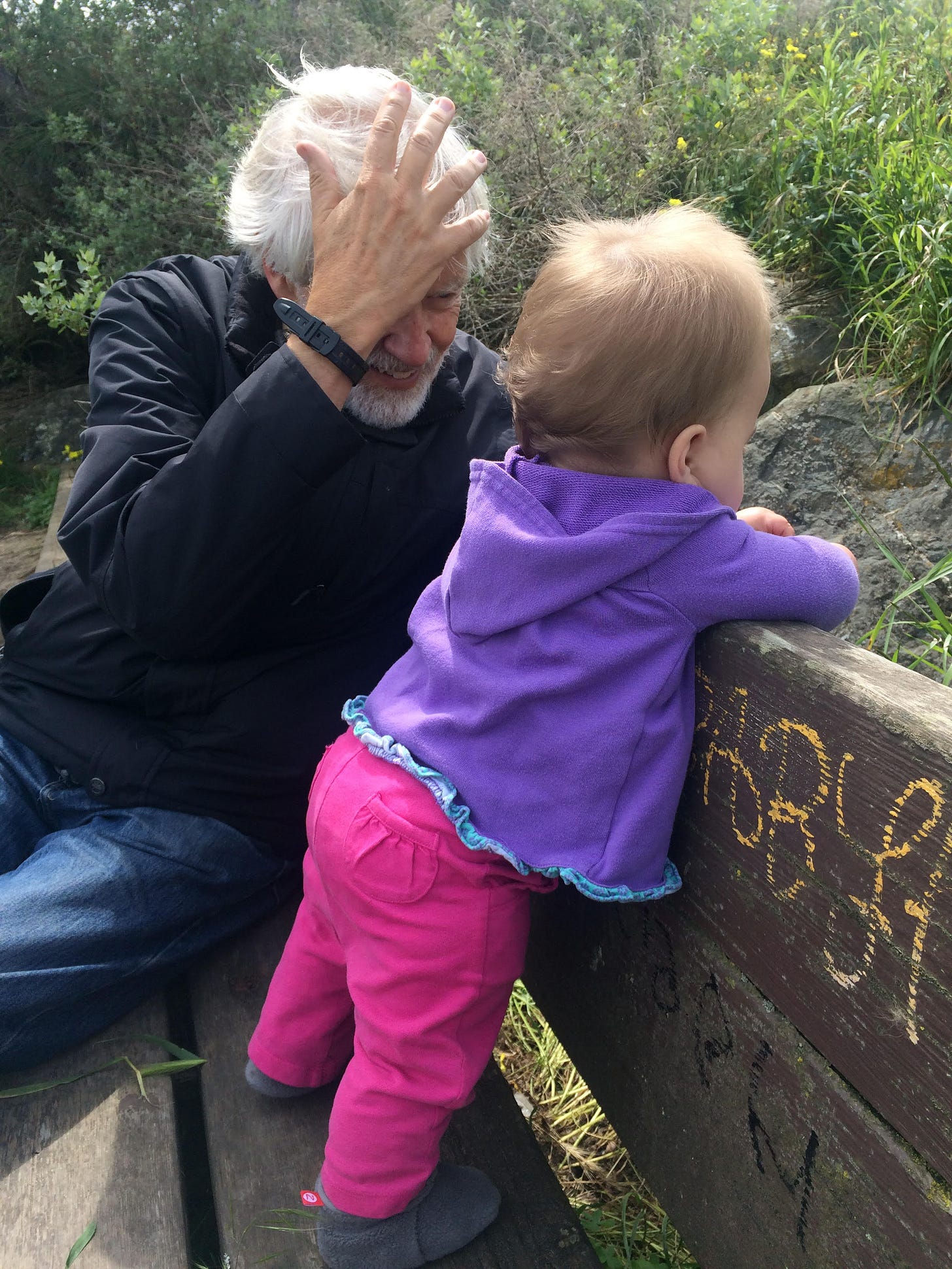How does your family handle heartbreak?
I’ve been thinking about this question a lot lately. There is plenty of heartbreak going around. I’m sure there always is, but somehow I have been proximate to an unprecedented amount when it comes to my own little life as of late. Illness—sudden and chronic, cancer, and car accidents. Break-ups, breakdowns, generational trauma surfacing in all of its creative and stubborn ways, like the most prolific weed that ever was. It’s a lot to hold, to process, to heal from, and we’re all meeting the moment with such varied capacities, cultural conditioning, and temperaments.
An example: when I was a kid, I remember that Christmas time was triggering for my dad. He grew up in a family that was constantly going bankrupt and so the sight of a tree with a pile of presents under it took him back to moments when his dad would buy a lot of stuff that they couldn’t afford—an attempt to perform normalcy and even abundance—and then suffer the consequences later. It didn’t matter that we could afford our pile of presents (my dad—surprise surprise—became a bankruptcy lawyer); the unhealed trauma of answering the door for debt collectors as a kid and pretending his parent weren’t home was deep in my dad and would not be ripped out by rationality.
As a kid, I experienced this dynamic more than observed it—like a gas that would fill the house, not noxious, but subtle, something to do with tense foreheads and migraines, something to do with old stories that I didn’t fully know. Eventually my parents would spell all of this out for me—largely because I demanded they do so—but I was picking up on the heartbreak all along.
In the absence of realistic paintings, kids hold abstract impressions. I became a person, a parent eventually, who similarly finds a lot of gifts under a tree sickening. Part of it is my political ideology, sure, but there is a deeper anchor—an emotion outsized next to my ideas about consumerism. It’s a tense forehead. Maybe even a migraine. It’s inherited heartbreak. In some small way, it feels like a loyalty pact with my dad.
If you ask me—how did your family of origin handle heartbreak?—I have a hard time answering coherently. On the one hand, what I just shared is true—we were swimming in a lot of unhealed and half-healed waters, like every other family on earth. On the other hand, my dad went to therapy and did some brave work becoming a father he never had—a rare and glorious thing. How did my family of origin handle heartbreak? There’s no complete or absolute answer.
One of the people who became a significant teacher for my dad was Father Richard Rohr, a Franciscan friar and ecumenical figure. I was listening to a conversation between Father Rohr and social worker and researcher Brene Brown recently, and they started talking about grace—that elusive, unconditional kindness in the face of imperfection, “bad behavior,” and yes, heartbreak. Brene Brown says that she is struggling to unlearn her ideas about grace because she has believed up until that point that, “Grace will always be a humiliation for me.”
That line took my breath away. Grace, this thing that so many of us crave more than anything else—from our communities, our friends, our families, our partners, our kids, our gods—is also a thing that leaves us humiliated. It makes us feel so ferociously fragile to require grace. Sometimes I feel a bit of relief in needing it, like I have finally given up my own performance of transcending being as f-ed up as everyone else, but mostly it is terrifying. To be lost and messy and heartbroken. To carry a truth you don’t know how to bear. To say it aloud in front of others, or even just yourself.
In this way, perhaps the question I’m really trying to ask is: how does your family handle heartbreak and how does your family receive grace? Not give grace, which is something I think we are more comfortable talking about, modeling, identifying with—receiving grace.
I’ve had Richard Rohr’s and Brene Brown’s voices in my head these last few weeks. I’ve also had parenting expert Becky Kennedy’s. She says that our job is not to fix our children’s heartbreak, but to sit on the bench beside them. That helps me when my daughters are struggling through a thing that I want to solve. Sit on the bench, I tell myself. Sit on the bench. Dr. Becky is advocating a kind of parental grace—to be with their heartbreak without being humiliated by it because of my own unhealed ego, and to make every attempt to model for them that accompaniment is not humiliation, but human.
The even more advanced version of this would be to let my daughters also witness me being accompanied on my own bench. As parents, we want our kids to feel like we are their rocks, and that’s appropriate; kids can only handle so much instability. But too often I think we mistake stability for invulnerability and we underestimate their power of witness. They are making their impressionistic paintings all the time. How can we give our children the truth, as it becomes digestible, that we are both broken and healing all the time, that we transcend and fall back within this generational story, that we need grace, and that that need is part of what makes us human? Better yet, how can we give ourselves the gift and grounding of that truth?
How did your family handle heartbreak and receive grace? How are you trying to do that differently now?






I feel strongly everything you wrote and have been working hard on this for many, many years.
What I will say for my father, who had great trauma in his life beginning with losing his own mother when he was 4 to the Spanish flu and then surviving the Holocaust, is that he found, in a sense, a love story he could live in. He loved me and my sister to the ends of the Earth.
The poet John O'Donohue writes that 'Love casts a widening pool of light.'
Does it solve all problems? Not even close. But it is an anchor as one is tossed in the waves.
I feel that, rely on it, in my own life.
Speaking of generational trauma, which you partly were, makes me think of my mother, and by extension, my own mothering. My mom grew up with a dad who was an alcoholic and a gambler, but also with a mom who exemplified the expectation of women to deny and keep it moving. My grandmother famously told me once that my grandfather wasn't an alcoholic because he "never drank in the house." And my mother has finally reflected in more recent years that growing up in that environment taught her that there was no use wasting emotional energy on things you can't fix (like your dad being a drunk), so you just stuffed down whatever complicated feelings you might have about it and "took care of business."
This made my mom someone who had no patience at all for excessive emotion, or "drama" as it is so often named. Our family was, to put it mildly, heartbreaking. Generational addiction and unresolved anger everywhere. But we were never allowed to talk about it because that wasn't "taking care of business."
With my own children I have, as a result, endeavored to create a different expectation, for them and for me. They are allowed to have all their feelings, as am I. When my feelings make me behave in ways that are sub-optimal I have always been quick to take responsibility and apologize and talk with them about the reality of big feelings and how we have to behave in the wake of our emotions getting away from us. My children have extended me tremendous grace over the years of us growing up together and I will never not be grateful, as humbling as it has been sometimes to need it. I have also tried my best to extend constant grace to them as they feel all their feelings, which isn't easy. Sometimes I can feel my mother rise up in me-- that sense of overwhelm in the face of all of it, the desire to just make them stop so they won't trigger my own big feelings by shutting them down and insisting they simply do what needs doing (silently, preferably). I have to take deep breaths and remind myself why I committed to making things different for them. They are 15 and 19 now and I am still working on it.